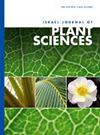来自chebula的植物化学物质五没食子糖能有效阻止SARS-CoV-2的进入:在硅研究中
IF 0.7
4区 生物学
Q4 PLANT SCIENCES
引用次数: 3
摘要
COVID-19是当前全球面临的卫生挑战。它起源于中国武汉,现已传播到180多个国家。这是一种通过飞沫传播的人畜共患疾病。疾病的严重性很可能只随着疫苗的发现而结束。研究人员正在重新利用药物来填补COVID-19和疫苗设计之间的空白。广谱抗病毒药物是首选,但它们有副作用。我们已经筛选了chebula中存在的可以阻止SARS-CoV-2进入宿主细胞的五烯丙基葡萄糖。在本研究中,我们对chebula Terminalia的8种活性植物化学物质,包括没食子酸、chebullic酸、chebulanin、新chebullinic酸、鞣花酸、chebulagic酸、chebullinic酸、chebullinic acid和pentagalglyglucose,进行了抗SARS-CoV-2的刺突蛋白(S1和S2)、复制酶多蛋白、3c样蛋白酶(3CL pro)、木瓜蛋白酶(PLpro)、RNA依赖性RNA聚合酶(RdRp)的研究。利用HADDOCK在线服务器、Discovery Studio Visualizer和PyRx Vina工具对天牛的潜在成分进行筛选。分析表明,五没食子糖是一种较好的抗穗蛋白S1的植物化学物质,与流感病毒的血凝素相似。这种植物化学物质可以进一步用作对抗SARS-CoV-2的药物。本文章由计算机程序翻译,如有差异,请以英文原文为准。
Pentagalloylglucose, a phytochemical from Terminalia chebula can efficiently prevent SARS-CoV-2 entry: In Silico study
COVID-19 is the current health challenge across the world. It originated in Wuhan, China, and has now spread to more than 180 countries. It is a zoonotic disease which spreads through droplets. The severity of disease is likely to end with the discovery of vaccines only. Researchers are repurposing drugs to fill the gap between COVID-19 and vaccine designing. Broad-spectrum antiviral drugs are preferred but they exhibit side effects. We have screened pentagalloylglucose present in Terminalia chebula which can prevent SARS-CoV-2 entry to the host cell. In this study, we have taken 8 active phytochemicals of Terminalia chebula which include gallic acid, chebulic acid, chebulanin, neochebulinic acid, ellagic acid, chebulagic acid, chebulinic acid, and pentagalloyglucose against spike proteins (S1 and S2), Replicase Polyprotein, 3C-like protease (3CL pro), Papain-like protease (PLpro), RNA dependent RNA polymerase (RdRp) of SARS-CoV-2. HADDOCK online server, Discovery Studio Visualizer and PyRx Vina tools were used to screen the potential component from T. chebula. It was analysed that pentagalloylglucose can be a better phytochemical against spike protein S1 similar to hemagglutinin of influenza virus. This phytochemical can be further used as a drug against SARS-CoV-2.
求助全文
通过发布文献求助,成功后即可免费获取论文全文。
去求助
来源期刊

Israel Journal of Plant Sciences
生物-植物科学
CiteScore
1.90
自引率
0.00%
发文量
17
审稿时长
>12 weeks
期刊介绍:
The Israel Journal of Plant Sciences is an international journal of extensive scope that publishes special issues dealing with all aspects of plant sciences, including but not limited to: physiology, cell biology, development, botany, genetic
 求助内容:
求助内容: 应助结果提醒方式:
应助结果提醒方式:


